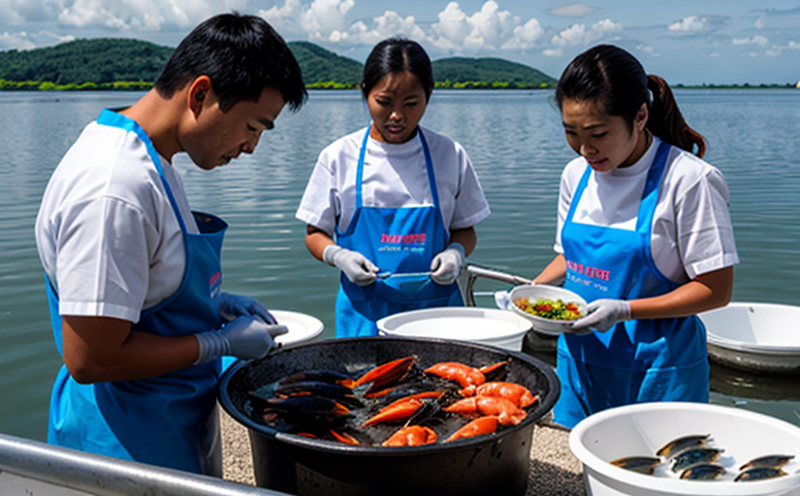ISO 14505 Paralytic Shellfish Poisoning (PSP) Detection
The detection of paralytic shellfish poisoning (PSP) is a critical aspect of food safety and quality management in seafood and aquaculture industries. PSP, caused by the consumption of toxic Alexandrium species of algae, can lead to severe illness or even death if not detected and controlled effectively.
Our laboratory specializes in ISO 14505-2:2019, a globally recognized standard for the determination of saxitoxin (STX) and its analogues in shellfish. This method is widely used to ensure compliance with international food safety regulations, such as those set by Codex Alimentarius, ensuring that seafood products are safe for consumption.
Our testing process begins with the collection of samples from various points along the supply chain, including harvested shellfish and aquaculture products. Each sample undergoes rigorous quality control checks to ensure its integrity before processing. The specimens are then prepared according to ISO 14505-2:2019 guidelines, which include homogenization, extraction, and purification steps.
The detection of PSP relies on the use of liquid chromatography-tandem mass spectrometry (LC-MS/MS) instrumentation. This advanced technology allows for precise quantification of saxitoxin analogues, providing accurate results that are crucial for regulatory compliance.
Our laboratory is equipped with state-of-the-art LC-MS/MS systems and trained personnel who adhere strictly to the ISO 14505-2:2019 standard. This ensures consistent and reliable test results every time. Our commitment to quality is reflected in our adherence to international standards and our continuous improvement efforts aimed at reducing turnaround times without compromising accuracy.
The importance of PSP detection cannot be overstated, especially given the potential for severe health consequences associated with its presence. By providing accurate and timely testing services, we help protect public health and ensure consumer confidence in seafood products.
| Applied Standards | Year | Description |
|---|---|---|
| ISO 14505-2:2019 | 2019 | Determination of saxitoxin and analogues in shellfish. |
| Codex Alimentarius | Continuous | International food safety standards for seafood products. |
The standardization and regulation provided by ISO 14505-2:2019 ensure consistency across different regions, making it easier for stakeholders to comply with global requirements. This is particularly important in the context of international trade where harmonized testing protocols are essential.
Our laboratory’s expertise in this field allows us to offer comprehensive services that go beyond mere compliance. We provide detailed reports and recommendations tailored to each client's specific needs, helping them maintain high standards of food safety within their operations.
Why It Matters
- Ensures public health protection by preventing the distribution of contaminated seafood products.
- Aids in maintaining consumer trust through consistent and reliable testing results.
- Facilitates international trade compliance with stringent food safety regulations.
- Supports sustainable aquaculture practices by identifying potential risks early on.
The significance of PSP detection extends beyond mere regulatory requirements. It plays a vital role in safeguarding public health, fostering consumer confidence, and promoting sustainable practices within the seafood industry. By adhering to international standards like ISO 14505-2:2019, we contribute to a safer food supply chain.
Applied Standards
| Standard | Description |
|---|---|
| ISO 14505-2:2019 | Determination of saxitoxin and analogues in shellfish. |
| Codex Alimentarius | International food safety standards for seafood products. |
The use of these internationally recognized standards ensures that our testing methods are consistent, accurate, and up-to-date with the latest scientific advancements. This consistency is crucial in maintaining trust both internally within the organization and externally with stakeholders such as regulatory bodies and consumers.
Competitive Advantage and Market Impact
- Leadership in PSP detection services, ensuring compliance with global standards.
- Access to cutting-edge LC-MS/MS instrumentation for precise quantification of toxins.
- Comprehensive reporting and recommendations that help clients maintain high food safety standards.
- Dedicated team of experts specializing in seafood testing and regulation.
Our commitment to excellence in PSP detection services has positioned us as a leader in this field. By staying at the forefront of technological advancements and regulatory changes, we continue to build on our competitive advantage while making significant contributions to market impact through enhanced food safety practices.





